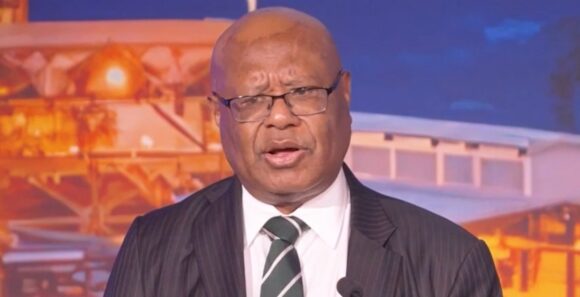Papua New Guinea’s National Executive Council recently approved the framework for the ‘most significant’ fiscal and regulatory reform since independence, Petroleum Minister Jimmy Maladina confirmed at the 2025 PNG Petroleum & Energy Conference in Port Moresby earlier this month. Business Advantage PNG outlines the key details of this new policy.

PNG Petroleum Minister Jimmy Maladina. Credit: PEC PNG
The Marape-Rosso government’s proposed new production sharing contract (PSC) framework for future oil and gas projects is Papua New Guinea’s “most significant” fiscal and regulatory reform since independence, according to Petroleum Minister Jimmy Maladina.
Speaking at the 2025 PNG Petroleum & Energy Conference on 8 October, Maladina confirmed that the National Executive Council recently approved the framework – a long-term aspiration of the Marape-Rosso government – and said that it will be brought to industry stakeholders for consultation in coming weeks.
Production sharing contracts differ in the fact that the host government retains ownership of the petroleum resource, while the investor is entitled to a stipulated share of production.
“The current oil and gas fiscal and regulatory regime has not always met our expectations,” he told the conference. “The State’s share of revenue from purchase is well below 50 per cent, diluted through deductions during project life.”
The new framework will introduce “a fairer, clearer and globally recognised system,” he said, adding, “The PSC aligns the interests of the State and investors through shared production, early revenue [and] transparent cost oversight, and enables effective and efficient regulatory functions.”
Production sharing
Under the proposed production sharing framework, project developers will recover their capital and operational costs, including exploration costs, after first petroleum is produced, according to Maladina.
The National Petroleum Authority (NPA) – which was established in March as part of the reforms – “will ensure recoverable costs are visible, fair and transparent,” he said.
Following cost recovery, the remaining petroleum revenue will be shared between the State and the project participants, based on the project’s profitability.
“The developers’ acceptable internal rate of return will be maintained and sustained,” Maladina reassured conferees ne delegates.
The State would receive a minimum of 10 per cent of gross revenue from start of production, with landowners and provinces to each receive 2 per cent of gross revenue.
“This is similar to the current arrangement. However, it will be from the gross [revenue] and not from the wellhead value, which allows for deductions [in the cost recovery stage],” Maladina said.
Other key details in the new framework include:
- Taxation: project investors will continue to pay corporate tax on their profit share, with the State’s share to flow directly into consolidated revenue.
- National petroleum levy: a 0.5 per cent levy on gross revenue will fund the NPA’s operations, data systems and technical capacity.
- Equity and participation: the State will have the option and first right of refusal to acquire up to 20.5 per cent equity through its nominee on commercial terms. Landowners, the provincial government and local-level governments will receive a 2 per cent free carry stake from the State.
- Infrastructure: the State will own all infrastructure used for extraction, transportation, processing and sale of petroleum.
Balancing competing interests
Maladina said in his speech that the new framework “aligns” with those of Indonesia, Malaysia and Brunei, and “signals to the market that PNG is open, reliable and reform-driven.”
He confirmed that the framework would only apply to future projects, while existing projects such as PNG LNG, Papua LNG, P’nyang, Pasca A will continue to be covered by the existing Oil & Gas Act 1998.
In concluding his speech, he argued that the new framework “strikes a balance” between the PNG national interest and investor confidence.
“For the State, it secures early and reliable revenue,” he said.
“For landowners and the provinces, it delivers guaranteed participation and visible benefits.
“For investors, it offers contractual certainty, transparent fiscal terms and competitive returns.”
What are production sharing contracts?
A production sharing contract is an agreement between a host government and a private sector participant (or investor) under which the government contracts the investor to conduct oil and gas exploration and production activities in a specific area and for a specific period of time.
Under the concession system used currently in PNG and in much of the world, the investor purchases the exclusive right to use a subsoil area for exploration and production and pays taxes and royalties to the State.
PSCs differ by the fact that the host government retains ownership of the petroleum resource, while the investor is entitled to a stipulated share of production.
Indonesia pioneered the use of production sharing contracts in the 1960s, and the model is now used in many emerging economies as a way to attract international oil companies to develop oil and gas resources while retaining overall ownership of the resource.








Speak Your Mind